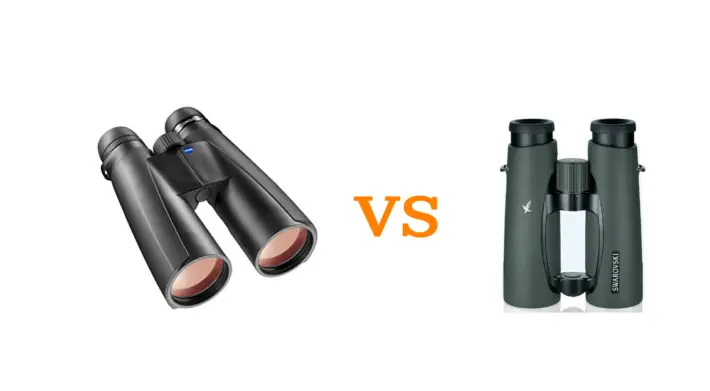Are you looking for good binoculars but are confused between Zeiss Conquest HD 10×42 vs Swarovski? This is a comprehensive guide that will help you see the differences between these two popular and reliable binoculars.
Even the best products have flaws, and the two giants, Zeiss and Swarovski, binoculars are no exception. The two are some of the most popular binoculars of their respective brands. Choosing one over the other is quite a task, and it would only be best if we compare them against each other to know which one best suits different applications.
Today I want us to create a clear comparison of Zeiss Conquest HD 10×42 vs Swarovski; this will help guide you on which one you should consider buying. Let us begin with a quick comparison table:
Zeiss Conquest HD 10×42 vs Swarovski Quick Comparison Table
 |
 |
| Zeiss 10×42 Conquest HD Binocular with LotuTec Protective Coating (Black) | Swarovski EL Binocular 10×42 |
|
|
Zeiss Conquest HD 10×42 vs Swarovski Full Review Comparison
Construction
The Zeiss Conquest HD 10×42 binocular features a compact and robust construction with an ergonomically placed large focusing wheel, which makes focusing easy even when wearing gloves. It has a rotating and lockable eyecup that can be adjusted to accommodate people with eyeglasses. It is nitrogen-filled and sealed for reliable fog-proof and waterproof performance.
Swarovski 10×42 binocular also features an ergonomic design with a light and sturdy magnesium body. The binocular is connected with a rotating strap connector which makes it easy to carry around. It features an open bridge design that is easy to handle with a single hand.
Both binoculars are made of strong construction for durability but are small and easy to handle.
Size
The Zeiss Conquest 10×42 weighs 795 grams/28 oz. while the Swarovski SLC is lighter at 765 grams or 27 oz. The Zeiss optic measures 150 mm/5.9 inches in length while the Swarovski measures 144 mm or 5.7 inches.
The Swarovski binocular has more compactness. However, both binoculars are lightweight and have a closely similar compact size. Both are covered in non-slippery protective armor for a firm grip.
Lens Coating
Lens coatings are important in ensuring that you have a great viewing experience. The two binoculars from Zeiss and Swarovski have lens coatings, but the latter has better light transmission of up to 91%. This gives edge-to-edge clarity for brighter, clearer images.
Magnification
The first number of a binocular represents its magnification power while the second is the objective lens size. In the case of Zeiss Conquest HD 10×42 and Swarovski 10×42 binoculars, the magnification is 10 times, which is perfect for most outdoor activities. With both binoculars, you will see objects ten times the size you’d see with normal eyesight.
Field of View
A large field of view is always a plus when using binoculars as it provides easier and quicker target acquisition. This is mainly important when bird-watching, hunting, or even during nature walks.
The Zeiss Conquest 10×42 HD binocular has the largest field of view in its class. It has 115 meters at 1,000 meters (377 ft. at 1,000 yards) FOV compared to 110 meters at 1,000 meters (330 ft. at 1,000 yards) of the Swarovski SLC 10×42 binocular. The viewing angle is 6.6° in Zeiss and 6.3° in Swarovski.
Pros and Cons
From the discussion above, we can make several conclusions based on the performance and structure of each binocular.
Zeiss Conquest HD Binocular
Pros
- It is made of a compact and ergonomic design
- It is fully waterproof and fog-proof
- It features revolutionary LotuTec water-resistant coatings
- It has premium Schott glass, which provides high-resolution images
- The highly sensitive focusing knob allows easy focus adjustments
Cons
- It has a short pupillary distance
- It is more highly priced
Swarovski SLC
Pros
- It is made of a compact and sleek design
- It is highly durable
- There is no chromatic aberration or color fringing
- It has coated lenses for perfect clarity
- There is no image degradation at the edges, thus ensuring edge-to-edge clarity
Cons
- It is expensive
- The close-focus distance is only 3 m
Conclusion
The two binoculars have an ergonomic design, which is very crucial in ensuring a firm grip for ease of use and durability. They are easy to use and can be used for long hours thanks to their lightweight. They both have coated lenses for clear images and can fit different outdoor applications.
To determine which is best for you, the FOV and your budget might be the main factors you consider with these two binoculars.

